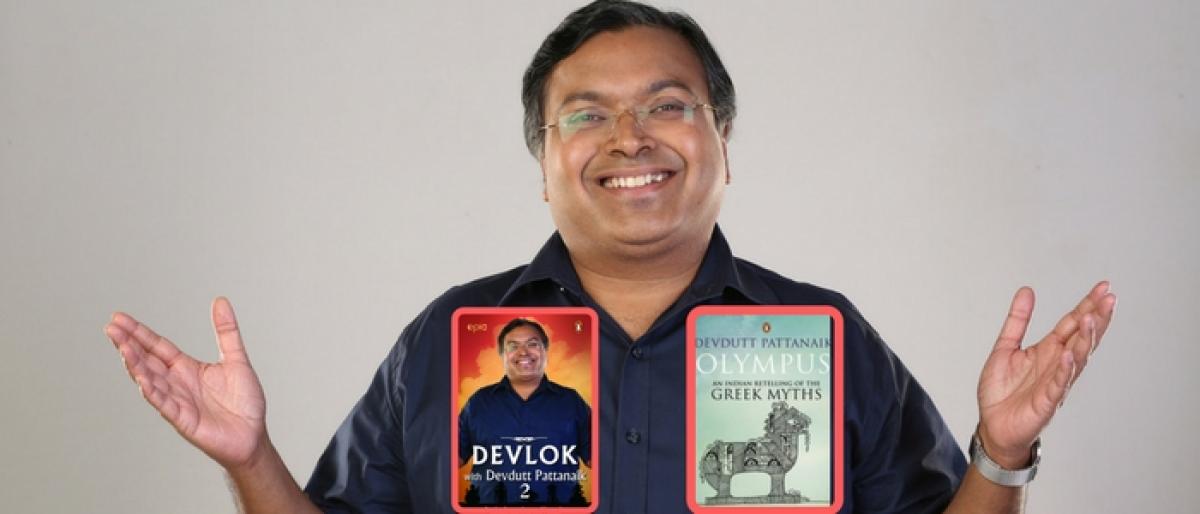Live
- Allu Arvind Thanks Government for Meeting, Assures Action on Preventing Incidents Like Sandhya Theater Tragedy
- Debate Erupts Over 'Dammunte Pattukora Shekavattu' Song from Pushpa 2
- Boxing Day 2024: Why Do We Celebrate It? History, Significance, and Celebration
- Veer Bal Diwas 2024: Inspiring Wishes, Messages, and Quotes to Share
- Congress' Belagavi session: Country facing several issues, says KC Venugopal
- 4th Test: Bumrah leads India’s fightback as Smith’s 68 not out takes Australia to 311/6
- Lalu Prasad slams Nitish govt for lathi-charge on BPSC candidates
- Telugu cinema rings in 2025 with the re-release of classic hits
- 5-yr survival rate for cancer patients in S. Korea reaches 72.9 pc: Report
- HIL: Looking forward to contributing to Soorma's success, says Harmanpreet Singh
Just In

‘Devlok With Devdutt’ looms his voice as it announces this television programme that can, in a way, be defined as a worldly take on the epics and scriptures, where the prolific physician-turned-mythologist and author Devdutt Pattanaik explains the rituals, the Hindu belief system and Gods and Goddesses in his matter of fact, simple and conversational narrative; a style which readers of his books a
Devdutt Pattanaik, in a freewheeling chat, speaks about study of Hinduism, becoming an author and his books
‘Devlok With Devdutt’ looms his voice as it announces this television programme that can, in a way, be defined as a worldly take on the epics and scriptures, where the prolific physician-turned-mythologist and author Devdutt Pattanaik explains the rituals, the Hindu belief system and Gods and Goddesses in his matter of fact, simple and conversational narrative; a style which readers of his books are well-versed with.
Recently, Penguin publishers released a book based on the Season 2 of the popular television series, ‘Devlok with Devdutt Pattanaik 2’.
In addition to authoring books on Indian mythological characters like ‘Shikhandi’, ‘The Book of Ram’, ‘Sita’, he has also written ‘Olympus’ based on Greek mythology. It is infact an Indian retelling of the Greek myths. Here are excerpts from an interview with the author at Jaipur Literature Festival during the beginning of the year.
About his book ‘Olympus’
I thought of writing a book on Greek mythology 10 years ago, but the publishers thought that it may not sell then. Finally, I said that now I have enough readership and they would be interested in this idea not because of the commonality, but there are also differences. We believe in ‘Punarjanam’ and ‘Karma’ and these ideas don’t exist in the Greek mythology. Fundamental to Indian thought is ‘Karma’.
Western scholars try to force fit Hinduism into the Greek thoughts because they don’t understand. They do not realise that Hinduism is different; it is based on rebirth and dharma. People use dharma as if it is justice. But, dharma cannot be understood without karma. Karma is about rebirth – ‘Punarjanam’. But people have written books on ‘Karma’ without referring to Punarjanma. You just pick up 10 books, which talk about of dharma then see how many people will talk about ‘Punarjanam’. Without talking about ‘Punarjanma’ without talking about rein or death you will never understand dharma.
On study of Hinduism
It cannot be studied, because Hinduism has to be experienced. It is about ‘Anubhava’ without which we cannot teach people the meaning of ‘Darshan’. You will go to Tirupati Balaji for Darshan and you will feel happy, but then, how do you document this in a book? How do you explain to people what is Brahmotsav?
You have to experience the ‘Rasa’, ‘Bhava’; and hence you cannot explain Hinduism using western parameters. In western philosophy, god is judge. In Hinduism, god is not a judge. God is an accountant to maintain your karmic account.
From a karmic point of view, the Bible will look very funny; from the karmic point of view Greek mythology will look very funny; from the karmic point of view western history will look very different. Are we allowed to look at west from the Indian point of view? Or should we only look India from the western point of view.
On becoming an author
This has been a parallel stream for about 15 years; I have to do a full time job in pharma industry. I lived in Hyderabad and worked in Apollo Health Street. This used to be my hobby, and now the hobby has become larger than life.
On the illustrations in his books
In science, when you explain a concept, you always write and do diagrams; in the same way when I explain mythology, I will write and illustrate because I think we can communicate many things with words, but many more things with lines. You can communicate in two ways - so one is very intellectual cognitive approach and another is sensory non-cognitive approach.
About his reason to write
I do have an agenda. I am writing for my pleasure. This concept is called “Aatma Rati”. I am glad that what I enjoy writing, the others are enjoying reading it too.

© 2024 Hyderabad Media House Limited/The Hans India. All rights reserved. Powered by hocalwire.com







